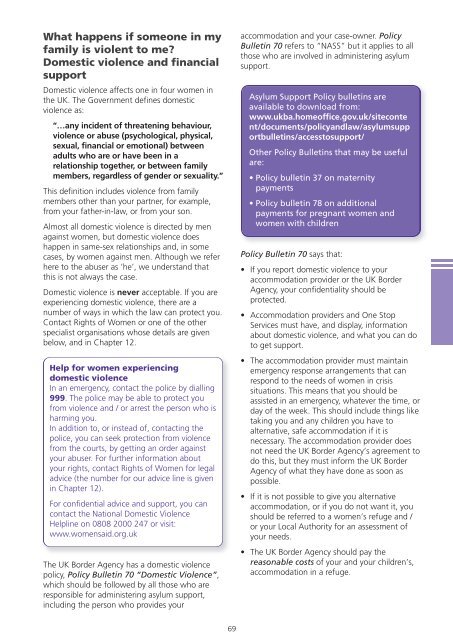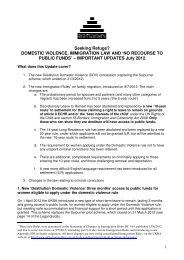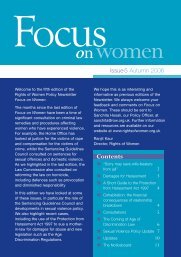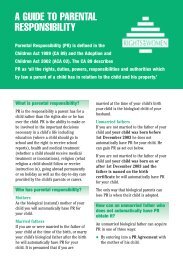Seeking Refuge? - Rights of Women
Seeking Refuge? - Rights of Women
Seeking Refuge? - Rights of Women
You also want an ePaper? Increase the reach of your titles
YUMPU automatically turns print PDFs into web optimized ePapers that Google loves.
What happens if someone in my<br />
family is violent to me?<br />
Domestic violence and financial<br />
support<br />
Domestic violence affects one in four women in<br />
the UK. The Government defines domestic<br />
violence as:<br />
“…any incident <strong>of</strong> threatening behaviour,<br />
violence or abuse (psychological, physical,<br />
sexual, financial or emotional) between<br />
adults who are or have been in a<br />
relationship together, or between family<br />
members, regardless <strong>of</strong> gender or sexuality.”<br />
This definition includes violence from family<br />
members other than your partner, for example,<br />
from your father-in-law, or from your son.<br />
Almost all domestic violence is directed by men<br />
against women, but domestic violence does<br />
happen in same-sex relationships and, in some<br />
cases, by women against men. Although we refer<br />
here to the abuser as ‘he’, we understand that<br />
this is not always the case.<br />
Domestic violence is never acceptable. If you are<br />
experiencing domestic violence, there are a<br />
number <strong>of</strong> ways in which the law can protect you.<br />
Contact <strong>Rights</strong> <strong>of</strong> <strong>Women</strong> or one <strong>of</strong> the other<br />
specialist organisations whose details are given<br />
below, and in Chapter 12.<br />
Help for women experiencing<br />
domestic violence<br />
In an emergency, contact the police by dialling<br />
999. The police may be able to protect you<br />
from violence and / or arrest the person who is<br />
harming you.<br />
In addition to, or instead <strong>of</strong>, contacting the<br />
police, you can seek protection from violence<br />
from the courts, by getting an order against<br />
your abuser. For further information about<br />
your rights, contact <strong>Rights</strong> <strong>of</strong> <strong>Women</strong> for legal<br />
advice (the number for our advice line is given<br />
in Chapter 12).<br />
For confidential advice and support, you can<br />
contact the National Domestic Violence<br />
Helpline on 0808 2000 247 or visit:<br />
www.womensaid.org.uk<br />
The UK Border Agency has a domestic violence<br />
policy, Policy Bulletin 70 “Domestic Violence”,<br />
which should be followed by all those who are<br />
responsible for administering asylum support,<br />
including the person who provides your<br />
accommodation and your case-owner. Policy<br />
Bulletin 70 refers to “NASS” but it applies to all<br />
those who are involved in administering asylum<br />
support.<br />
Asylum Support Policy bulletins are<br />
available to download from:<br />
www.ukba.home<strong>of</strong>fice.gov.uk/siteconte<br />
nt/documents/policyandlaw/asylumsupp<br />
ortbulletins/accesstosupport/<br />
Other Policy Bulletins that may be useful<br />
are:<br />
• Policy bulletin 37 on maternity<br />
payments<br />
• Policy bulletin 78 on additional<br />
payments for pregnant women and<br />
women with children<br />
Policy Bulletin 70 says that:<br />
• If you report domestic violence to your<br />
accommodation provider or the UK Border<br />
Agency, your confidentiality should be<br />
protected.<br />
• Accommodation providers and One Stop<br />
Services must have, and display, information<br />
about domestic violence, and what you can do<br />
to get support.<br />
• The accommodation provider must maintain<br />
emergency response arrangements that can<br />
respond to the needs <strong>of</strong> women in crisis<br />
situations. This means that you should be<br />
assisted in an emergency, whatever the time, or<br />
day <strong>of</strong> the week. This should include things like<br />
taking you and any children you have to<br />
alternative, safe accommodation if it is<br />
necessary. The accommodation provider does<br />
not need the UK Border Agency’s agreement to<br />
do this, but they must inform the UK Border<br />
Agency <strong>of</strong> what they have done as soon as<br />
possible.<br />
• If it is not possible to give you alternative<br />
accommodation, or if you do not want it, you<br />
should be referred to a women’s refuge and /<br />
or your Local Authority for an assessment <strong>of</strong><br />
your needs.<br />
• The UK Border Agency should pay the<br />
reasonable costs <strong>of</strong> your and your children’s,<br />
accommodation in a refuge.<br />
69
















